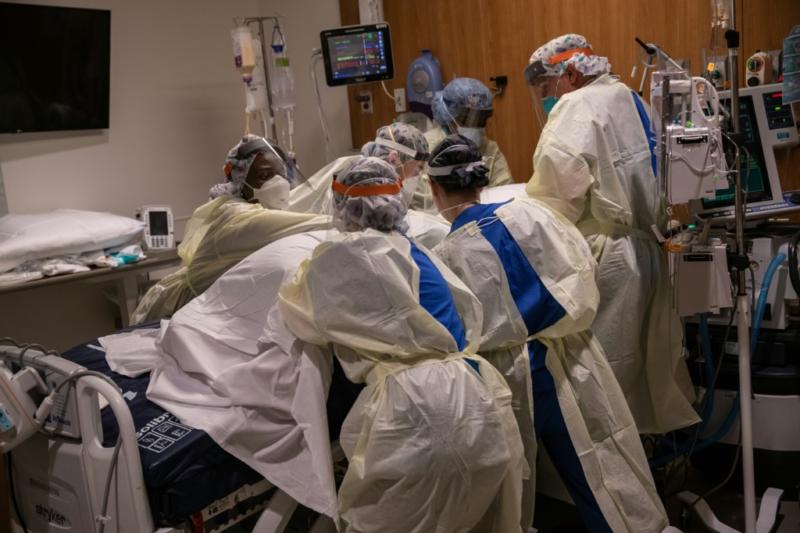From ‘hot zone’ to firestorm: US COVID medics draw on overseas experience
A team of doctors and nurses treat a coronavirus patient in Stamford, Connecticut, in April 2020 (JOHN MOORE)
Washington (AFP) – They have seen war and toured the world’s “hot zones” tackling the kind of biological hazards that can threaten civilizations. But for these returned exiles the US coronavirus outbreak has in some ways been more painful.
From New York and North Carolina to the Pacific Northwest, health care workers are making use of a skill set you can only master working with killer pathogens, sometimes in hostile terrain.
Doctor and academic David Callaway is leading the COVID-19 response in his hospital in Charlotte, North Carolina, and draws on his experiences in South Sudan, Haiti and Iraq.
While he is better resourced than in crisis-hit countries and doesn’t have to worry about security, the 46-year-old admits he found epidemics overseas easier to cope with in some ways.
“Family and loved ones, you can put them in a box and you use them as a source of motivation and inspiration when things get rough, but you know they are safe,” he told AFP.
“A pandemic at home, you know that your family and your loved ones are still at risk, their lives hang on the line.”
Callaway — a former navy doctor who is now chief medical officer for the disaster response charity Team Rubicon — worries in particular about his elderly mother but is also concerned for his wife and daughters.
“It’s more emotionally testing to do it in your home community than it is overseas, even if it’s at combat or you can be shot at,” he said.
– ‘Blood from an orange’ –
“Hot zone” is a term virologists use for the center of an outbreak of a maximum Level Four Biological Hazard – a “hot agent” like weaponized anthrax, smallpox or Ebola.
While SARS-CoV-2 has hit the elderly hard, its death rate pales compared with Ebola, which killed more than a third of the people it infected in Liberia, Guinea and Sierra Leone in 2014.
First identified in 1976 in what was then Zaire — where the death rate was nine in ten — it produces a hemorrhagic fever that in the worst cases causes patients to “crash and bleed out,” their insides reduced to soup before they breathe their last.
“The skills that I learned in West Africa were critical,” said emergency medicine specialist Craig Spencer from New York, one of the only Americans to fall ill with Ebola after returning from a mission with Medecins Sans Frontieres (Doctors Without Borders) in Guinea.
When he was hospitalized in 2014, a highly experienced nurse was so wary of his disease that she had trouble inserting a drip in his arm.
The nurse “missed an IV on me. Two times and then the third time hit a nerve. I’m sure she could get blood from an orange. This woman’s incredible but she was so scared,” he recalled in an online chat organized by MSF.
“We can drill — we can do a bunch of… experiential discussions and debriefs — but nothing is like the real thing,” he said.
His own case showed him that “we have so few people… that feel comfortable taking care of patients with a potentially deadly disease.”
Martha Phillips, a 40-year-old nurse, drew a different lesson from her experience with Ebola.
“I know how to work for an extended period of time in cumbersome” personal protective equipment, or PPE, she said.
“I also learned how to prioritize my own safety, and I have never compromised on that.”
Self-preservation has proven to be a key skill in a coronavirus pandemic that has seen its epicenter shift from China via Europe to the US, where there have been more than 63,000 deaths among a million registered cases.
As a specialist in emergency care, she dealt with some of the first coronavirus cases in Washington before signing up for the nightshift in a New York hospital when the city became the main US hotspot.
– Anger –
Having arrived shortly after the infection rate hit its peak in the city, she said she has seen fewer deaths than in Sierra Leone.
But this time she has been seized by a new emotion: anger.
“I was absolutely expecting the United States to respond differently,” she said.
“I was expecting them to prioritize the safety of their staff, to pull out all the stops to acquire PPE and equipment needed for the care of these patients, and to offer unmitigated support to the front-line workers.”
“Basically none of those things happened until it was far too late.”
Officials in West Africa, where Phillips worked until last year for the International Medical Corps NGO, responded “to the best of their ability” to Ebola.
The US, however, with all its infrastructural and technological advantages, chose to “stick their heads in the sand,” she said.
Whatever their state of mind, repatriated medical personnel say they are totally focused on the task at hand.
“We take all the precautions. We believe it’s our mission to care for people when they are sick,” said Callaway.
Disclaimer: Validity of the above story is for 7 Days from original date of publishing. Source: AFP.


